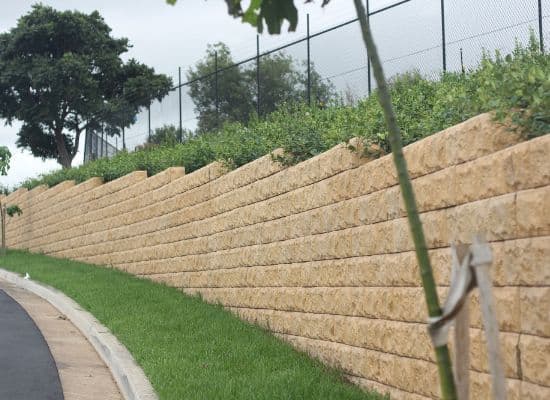Retaining Wall Specialists
- Protect Structures from weather damage
- Minimize erosion
- Enhance your landscaping

Retaining walls can be used to level a sloped yard, create garden beds, prevent soil erosion, conceal a building’s foundation, or add built-in seats to your property. Drainage, required strength, and the general harmony of the environment are all factors to consider when designing a retaining wall. Get a quote today for a bespoke retaining walls that complement the natural beauty of your home or neighborhood. Choose from a wide range of styles and materials. Retaining walls for: home garden, industrial, commercial, and road applications, to name a few. If needed you will get an engineer who will design and sign off on the final product.
The benefits and drawbacks of retainer walling:
Retaining walls have both beneficial and negative characteristics. Here’s a quick rundown of some of the benefits and drawbacks you can encounter.
- Your landscaping will not flood if you keep the retaining walls in place.
- Because these walls encircle buildings, they protect adjacent structures from being damaged by the weather.
- They can be used as a decorative feature in a well-landscaped yard.
- Homeowners can minimize as much upkeep as possible by using erosion-resistant walls.
- They minimize erosion and flow into your yard by keeping soil in place.

Retainer Walling Types
Earthform
Earthform Blocks are plantable, appealing, and prevent soil erosion. They are usually used by DIY enthusiasts to build aesthetic elements in their gardens. Not to mention the earthform garden blocks, which may be piled to a height of seven levels.
Enviro-wall
This block can be used to generate a variety of visual effects, and it can be used as a low or high wall and an angle or vertically. Planting vegetation in the spaces or simply using it as a solid framework are both options. This block can be used for a variety of purposes, including commercial, riverbank protection, industrial, and home purposes.
Terralite
The Terralite retainer block is popular among DIY enthusiasts since it is lightweight and ideal for small landscaping projects. It can be utilized as a border for flower beds, driveway walls, patio walls, braai areas, tree rings, and tree rings.
Loffelstein
Engineer-approved, inexpensive, and robust, the Loffelstein block is appropriate for practically any wall height. The Loffelstein block’s broad base prevents it from being crushed by the wall’s own mass. To reduce maintenance issues, only native plants must be planted in the block.
Florawall
The interconnecting form of the florawall block makes it ideal for planting lovely flowers because it retains soil efficiently. Its ribbed front adds to the overall appearance of your yard.




Frequently Asked Questions:
What causes retaining wall failure?
The retaining wall will fail if it is unable to withstand the force placed on it by the earth behind it. Our team of experts will ensure that your retaining wall can resist the force applied to it.
When it comes to retaining wall blocks, how long do they last?
The lifespan of a concrete retaining wall might range from 50 to 100 years.
Do you require retaining wall plans?
Yes, SABS-approved designs are required for all retaining walls.
Is it possible for the retainer wall to be vertical?
Some retainer blocks can be stacked vertically, depending on the sort of block you choose
What are the best plants to use in the retainer wall?
Plants thrive in full sun and containers. In a retainer wall, most native ground coverings will thrive.
What is the price per square meter?
The following factors will have an impact on the cost of your retaining wall:
- The block type that is being used
- The soil’s drainage
- Condition of the soil
- Slope in the back
Contact us today to find out more.
- Private and Secure
- Fast Response
- Affordable
Retainer Walling Service Areas
- Retaining Walls Alberton
- Retaining Walls Bellville Durbanville Brackenfell
- Retaining Walls Benoni
- Retaining Walls Bloemfontein
- Retaining Walls Boksburg
- Retaining Walls Brakpan
- Retaining Walls Cape Town
- Retaining Walls Centurion
- Retaining Walls Durban
- Retaining Walls East Rand
- Retaining Walls Edenvale
- Retaining Walls Fourways
- Retaining Walls George
- Retaining Walls Germiston
- Retaining Walls Johannesburg
- Retaining Walls Kempton Park
- Retaining Walls Krugersdorp
- Retaining Walls Midrand
- Retaining Walls Port Elizabeth
- Retaining Walls Pretoria
- Retaining Walls Randburg
- Retaining Walls Roodepoort
- Retaining Walls Sandton
- Retaining Walls Somerset West Strand
- Retaining Walls Springs
- Retaining Walls Vanderbijlpark to Vereeniging
- Retaining Walls Witbank
